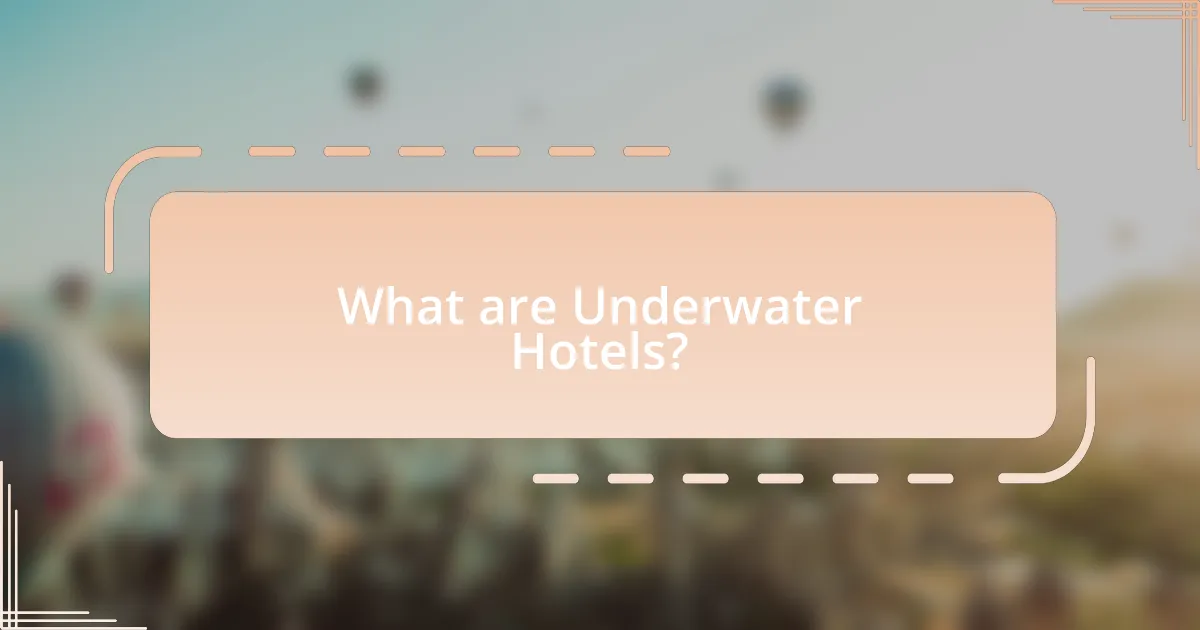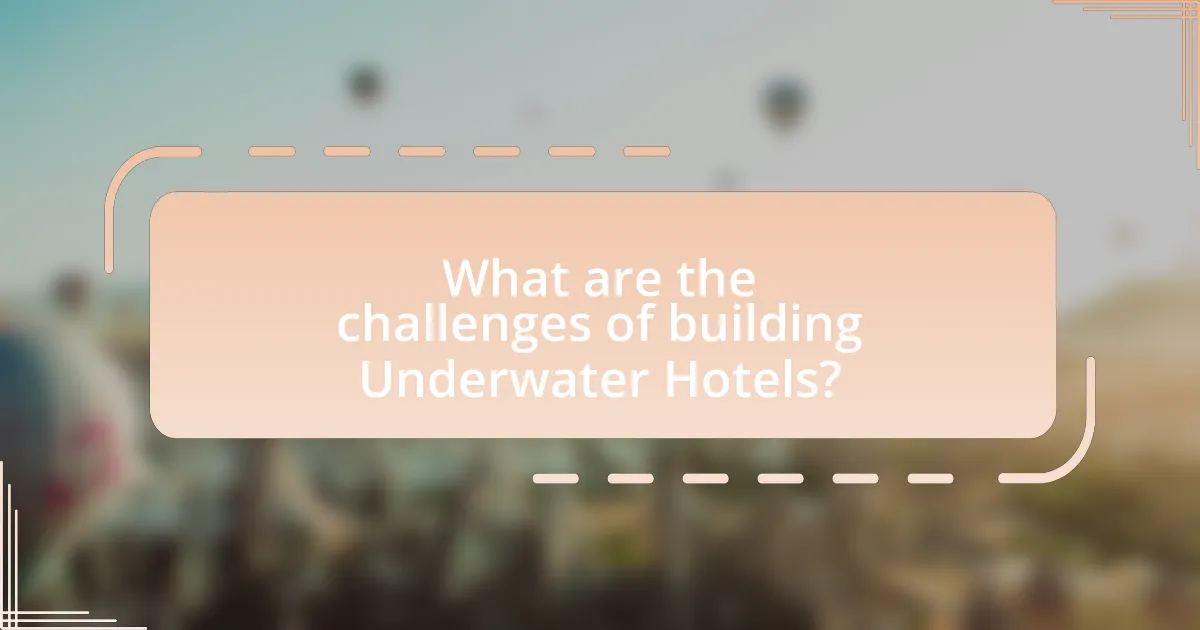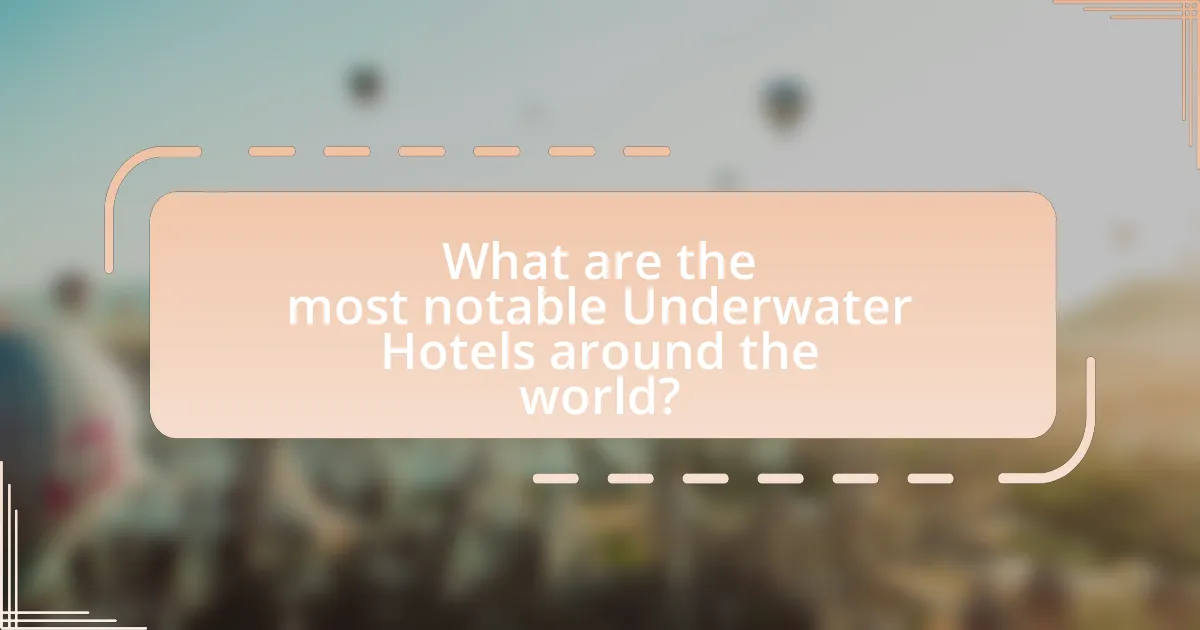Underwater hotels are innovative accommodations situated beneath the water’s surface, offering guests stunning views of marine life through large glass windows. These unique establishments, such as the Poseidon Undersea Resort in Fiji, combine luxury with immersive experiences, allowing visitors to observe underwater ecosystems while enjoying modern amenities. The article explores the distinct features of underwater hotels, their differences from traditional lodging, the engineering challenges involved in their construction, and the environmental considerations that shape their design. Additionally, it highlights notable underwater hotels worldwide, guest experiences, and the impact of reviews on their popularity, providing a comprehensive overview of this emerging trend in tourism.

What are Underwater Hotels?
Underwater hotels are unique accommodations located beneath the surface of water, providing guests with panoramic views of marine life through large windows. These hotels are designed to offer an immersive underwater experience, combining luxury with the natural beauty of aquatic environments. For instance, the Poseidon Undersea Resort in Fiji features underwater suites that allow guests to observe coral reefs and fish while enjoying modern amenities. The concept of underwater hotels has gained popularity since the early 2000s, with various projects around the world showcasing innovative architectural designs and sustainable practices.
How do Underwater Hotels differ from traditional hotels?
Underwater hotels differ from traditional hotels primarily in their location and design, as they are submerged beneath the water’s surface, offering unique underwater views and experiences. Traditional hotels are typically situated on land and provide standard amenities, while underwater hotels feature transparent walls that allow guests to observe marine life and underwater ecosystems directly from their rooms. For example, the Poseidon Undersea Resort in Fiji includes suites with panoramic views of the ocean, showcasing the distinct experience that underwater accommodations provide compared to conventional lodging options.
What unique features do Underwater Hotels offer?
Underwater hotels offer unique features such as panoramic underwater views, immersive marine life experiences, and innovative architectural designs that integrate with the aquatic environment. These hotels typically include large glass walls in guest rooms, allowing guests to observe oceanic ecosystems directly from their accommodations. Additionally, many underwater hotels provide specialized amenities like underwater dining experiences, spa services with ocean views, and direct access to snorkeling or diving activities, enhancing the overall guest experience. For instance, the Poseidon Undersea Resort in Fiji features an underwater restaurant and a unique design that allows guests to enjoy the surrounding marine life while dining.
How is the design of Underwater Hotels influenced by their environment?
The design of underwater hotels is significantly influenced by their marine environment, particularly in terms of structural integrity, aesthetics, and sustainability. The underwater pressure and water currents necessitate robust engineering solutions, such as reinforced materials and specialized construction techniques, to ensure safety and durability. Additionally, the visual design often incorporates panoramic views of marine life, enhancing guest experience while promoting ecological awareness. Sustainable practices, such as using renewable energy sources and minimizing environmental impact, are also integral to the design, reflecting the need to preserve the delicate underwater ecosystem. These factors collectively shape the architectural and operational aspects of underwater hotels, ensuring they harmonize with their surroundings while providing unique accommodations.
Why are Underwater Hotels becoming popular?
Underwater hotels are becoming popular due to their unique and immersive experiences that allow guests to stay submerged in marine environments. This novelty attracts travelers seeking adventure and exclusivity, as these hotels offer breathtaking views of underwater ecosystems, including coral reefs and diverse marine life. The rise in eco-tourism and a growing interest in sustainable travel also contribute to their popularity, as many underwater hotels emphasize environmental conservation and education. For instance, the Poseidon Undersea Resort in Fiji combines luxury with an underwater experience, showcasing the appeal of such accommodations.
What experiences do guests seek in Underwater Hotels?
Guests seek immersive marine experiences in underwater hotels, including breathtaking views of aquatic life, tranquility, and a unique sense of adventure. These hotels often provide large windows or transparent walls that allow guests to observe fish, coral reefs, and other marine ecosystems directly from their rooms. Additionally, guests are drawn to the novelty of sleeping beneath the ocean, which offers a rare opportunity to connect with nature in an extraordinary setting. The appeal is further enhanced by amenities such as fine dining with ocean views, spa services, and guided underwater excursions, all contributing to a memorable and luxurious stay.
How do Underwater Hotels contribute to tourism in coastal areas?
Underwater hotels significantly enhance tourism in coastal areas by offering unique and immersive experiences that attract visitors. These hotels provide guests with the opportunity to observe marine life and underwater ecosystems from their rooms, creating a novel attraction that differentiates them from traditional accommodations. For instance, the Poseidon Undersea Resort in Fiji features underwater suites with panoramic views of the ocean, drawing tourists seeking adventure and luxury. This unique offering can lead to increased visitor numbers, extended stays, and higher spending in local economies, as tourists often engage in additional activities such as diving, snorkeling, and exploring coastal attractions.

What are the challenges of building Underwater Hotels?
Building underwater hotels presents significant challenges, primarily related to structural integrity, safety, and environmental impact. The immense pressure of water at depth requires advanced engineering to ensure that the hotel can withstand these forces without compromising safety. Additionally, ensuring the safety of guests and staff from potential hazards such as flooding or structural failure is critical, necessitating robust emergency protocols and systems.
Environmental concerns also pose challenges, as construction and operation can disrupt marine ecosystems. Regulations often require extensive environmental assessments to mitigate negative impacts on local wildlife and habitats. Furthermore, logistical issues such as transportation of materials and personnel to remote underwater sites complicate the construction process. These factors collectively make the development of underwater hotels a complex and demanding endeavor.
How do environmental factors impact the construction of Underwater Hotels?
Environmental factors significantly impact the construction of underwater hotels by influencing design, materials, and structural integrity. The underwater environment presents challenges such as water pressure, salinity, and marine life interactions, which necessitate specialized engineering solutions. For instance, the pressure at depths of 10 meters can exceed 1 atmosphere, requiring robust materials like reinforced concrete or acrylic to withstand these conditions. Additionally, the corrosive nature of saltwater demands the use of anti-corrosive coatings and materials to ensure longevity. Furthermore, environmental regulations and sustainability considerations, such as minimizing disruption to marine ecosystems, also shape construction practices and site selection for underwater hotels.
What engineering solutions are used to ensure safety and stability?
Engineering solutions used to ensure safety and stability in underwater hotels include reinforced structural designs, advanced buoyancy control systems, and pressure-resistant materials. Reinforced structural designs, such as the use of concrete and steel frameworks, provide the necessary strength to withstand underwater pressures. Advanced buoyancy control systems help maintain stability by adjusting the water displacement, ensuring the hotel remains level and secure. Additionally, pressure-resistant materials, like specialized glass and composite materials, prevent leaks and structural failures, which are critical for the safety of occupants. These engineering solutions are essential for creating a safe and stable environment in the unique setting of underwater accommodations.
How do hotels manage the effects of water pressure and marine life?
Hotels manage the effects of water pressure and marine life by utilizing advanced engineering techniques and specialized materials in their construction. These hotels are designed to withstand the immense pressure found at various underwater depths, often employing reinforced structures made from materials like steel and acrylic that can endure high-pressure environments. Additionally, hotels implement filtration systems and controlled environments to mitigate the impact of marine life, ensuring that guests can enjoy views of aquatic ecosystems without interference. For instance, underwater hotels like the Poseidon Undersea Resort have been designed with pressure-resistant glass and are equipped with systems to monitor and maintain water quality, demonstrating effective management of both water pressure and marine interactions.
What regulations must be considered when constructing Underwater Hotels?
When constructing underwater hotels, regulations related to marine environmental protection, building codes, safety standards, and zoning laws must be considered. Marine environmental protection regulations, such as those enforced by the National Oceanic and Atmospheric Administration (NOAA) in the United States, aim to preserve marine ecosystems and prevent pollution. Building codes ensure structural integrity and safety, particularly regarding pressure resistance and emergency evacuation procedures. Safety standards, including those set by the Occupational Safety and Health Administration (OSHA), address worker safety during construction and operation. Zoning laws dictate where such structures can be built, often requiring permits that assess the impact on local marine life and tourism. Compliance with these regulations is crucial for the successful and sustainable operation of underwater hotels.
How do local laws affect the development of Underwater Hotels?
Local laws significantly influence the development of underwater hotels by dictating construction regulations, environmental protections, and zoning requirements. These laws ensure that underwater structures comply with safety standards, which can include specific engineering practices to withstand underwater pressure and potential natural disasters. For instance, in regions like the Maldives, local regulations may require environmental impact assessments to protect marine ecosystems, thereby affecting the design and location of such hotels. Additionally, laws regarding land use and maritime boundaries can restrict where underwater hotels can be built, impacting their feasibility and profitability.
What environmental protections are in place for marine ecosystems?
Environmental protections for marine ecosystems include marine protected areas (MPAs), regulations on fishing practices, and international agreements aimed at conservation. MPAs restrict human activities to preserve biodiversity and habitats, with over 7% of the world’s oceans designated as such, according to the United Nations. Regulations on fishing, such as catch limits and gear restrictions, help prevent overfishing and protect vulnerable species. Additionally, international agreements like the Convention on Biological Diversity and the United Nations Convention on the Law of the Sea establish frameworks for sustainable use and conservation of marine resources. These measures collectively aim to safeguard marine ecosystems from degradation and ensure their long-term health.

What are the most notable Underwater Hotels around the world?
The most notable underwater hotels around the world include the Conrad Maldives Rangali Island, the Atlantis The Palm in Dubai, and the Jules’ Undersea Lodge in Florida. The Conrad Maldives features the Ithaa Undersea Restaurant and luxurious underwater villas, providing guests with panoramic views of marine life. Atlantis The Palm offers the underwater suites in the Aquaventure Waterpark, allowing guests to observe sharks and rays through their windows. Jules’ Undersea Lodge, located in a former research facility, is the only underwater hotel that requires guests to scuba dive to reach it, offering a unique experience in the Florida Keys. These hotels exemplify innovative design and immersive experiences in underwater accommodation.
What unique features do famous Underwater Hotels offer?
Famous underwater hotels offer unique features such as panoramic underwater views, luxurious accommodations, and immersive marine experiences. For instance, the Poseidon Undersea Resort in Fiji includes an underwater restaurant and a personal submersible for exploring the surrounding ocean. Additionally, the Jules’ Undersea Lodge in Florida allows guests to scuba dive to their rooms, providing an adventurous entry. These hotels often incorporate advanced technology for comfort and safety, such as pressure-resistant structures and high-quality air filtration systems, ensuring a secure and enjoyable stay beneath the waves.
How do the locations of these hotels enhance the guest experience?
The locations of underwater hotels significantly enhance the guest experience by providing unique, immersive views of marine life and underwater ecosystems. Positioned beneath the surface, these hotels allow guests to observe vibrant coral reefs and diverse aquatic species directly from their rooms, creating a one-of-a-kind atmosphere that traditional hotels cannot offer. For instance, the Conrad Maldives Rangali Island features underwater villas that provide panoramic views of the ocean, allowing guests to experience the tranquility and beauty of the underwater world without leaving their accommodations. This direct interaction with marine environments not only enriches the stay but also fosters a deeper appreciation for ocean conservation, making the experience both memorable and educational.
What amenities are commonly found in renowned Underwater Hotels?
Renowned underwater hotels commonly feature amenities such as panoramic underwater views, luxurious accommodations, fine dining restaurants, spa services, and direct access to marine activities. These hotels are designed to provide guests with an immersive experience of marine life, often incorporating large glass windows or transparent walls to enhance visibility of the underwater environment. For instance, the Poseidon Undersea Resort includes an underwater restaurant and a spa, while the Conrad Maldives Rangali Island offers underwater villas with private pools and butler service, showcasing the high-end amenities available in such unique accommodations.
How do guests rate their experiences in Underwater Hotels?
Guests generally rate their experiences in underwater hotels positively, often highlighting the unique ambiance and stunning marine views. Surveys and reviews indicate that many guests appreciate the novelty of staying submerged, with ratings frequently exceeding 4 out of 5 stars. For instance, a study published in the Journal of Hospitality and Tourism Management found that 85% of guests reported high satisfaction levels due to the immersive experience and exceptional service provided. This positive feedback is reinforced by numerous online platforms where guests share their experiences, showcasing a trend of favorable ratings across various underwater hotel establishments.
What feedback do guests provide about their stays in Underwater Hotels?
Guests typically provide positive feedback about their stays in underwater hotels, highlighting the unique experience of being surrounded by marine life. Many guests express awe at the panoramic views of the ocean and the tranquility that comes with being submerged underwater. Reviews often mention the novelty of the experience, with guests appreciating the opportunity to observe fish and other sea creatures up close. Additionally, visitors frequently comment on the luxurious amenities and the exceptional service provided by the hotel staff, which enhances their overall experience. Specific feedback often includes remarks about the comfort of the accommodations and the unique dining experiences available, further solidifying the appeal of underwater hotels as a distinctive travel destination.
How do reviews influence the popularity of Underwater Hotels?
Reviews significantly influence the popularity of underwater hotels by shaping potential guests’ perceptions and decisions. Positive reviews enhance credibility and attract more visitors, as travelers often rely on the experiences of others to gauge the quality and uniqueness of such accommodations. For instance, a study by BrightLocal in 2022 found that 87% of consumers read online reviews for local businesses, indicating that reviews play a crucial role in the decision-making process. Additionally, underwater hotels that receive high ratings on platforms like TripAdvisor or Booking.com tend to see increased bookings, as these ratings serve as social proof of the hotel’s appeal and experience.
What tips should travelers consider when booking an Underwater Hotel stay?
Travelers should consider the location, amenities, and safety features when booking an underwater hotel stay. The location is crucial as it determines the underwater views and accessibility; for instance, hotels in coral reef areas often provide stunning marine life experiences. Amenities such as dining options, spa services, and room features can significantly enhance the experience, with some hotels offering glass walls for panoramic views. Safety features, including emergency protocols and structural integrity, are essential for ensuring a secure stay, as underwater hotels must adhere to strict engineering standards to withstand pressure and potential water ingress.
How can travelers prepare for an Underwater Hotel experience?
Travelers can prepare for an underwater hotel experience by researching the specific hotel’s amenities, safety protocols, and environmental conditions. Understanding the unique aspects of underwater accommodations, such as potential water pressure and limited natural light, helps in adjusting expectations. Additionally, travelers should pack appropriate clothing for both underwater and above-water activities, considering the temperature and humidity levels. Familiarizing oneself with marine life and safety measures, such as emergency procedures, enhances the overall experience. Lastly, booking in advance and confirming reservations ensures a smooth arrival and stay.
What are the best practices for maximizing enjoyment during the stay?
To maximize enjoyment during a stay at an underwater hotel, guests should engage in activities that enhance their experience, such as exploring marine life through guided tours and utilizing in-room amenities designed for relaxation. Engaging with the unique underwater environment, like participating in snorkeling or diving excursions, allows guests to appreciate the surrounding ecosystem, which is often a highlight of underwater accommodations. Additionally, taking advantage of spa services and gourmet dining options available at these hotels can significantly enhance the overall experience. Research indicates that immersive experiences, such as those offered in underwater settings, lead to higher satisfaction levels among guests, as they create lasting memories and a sense of adventure.